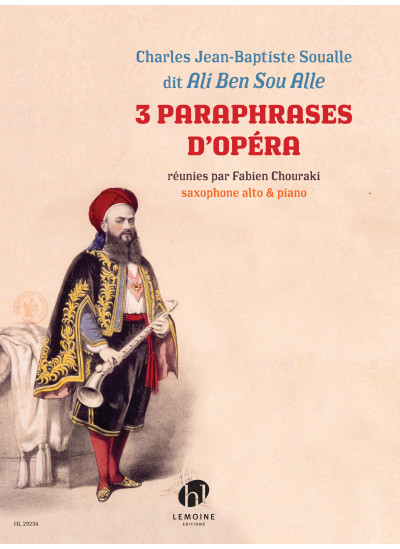
Paraphrases d'opéra (3)
Alto saxophone and piano
A mysterious 19th century saxophonist
The 19th century, though not so distant, remains full of surprises. By chance, I happened to learn about the existence of a saxophonist whose work deserves to be better known: Ali-Ben-Sou-Alle. A rare and unusual figure, he was a saxophonist, composer and editor, and an inventor as well, due to several important improvements he contributed to the saxophone.
Ali-Ben-Sou-Alle, whose real name was Charles-Jean-Baptiste Soualle, was born in Arras in 1824. He completed his studies at the Paris conservatory in 1844 with a first prize in clarinet. Named as director of military music for the navy troops in Senegal, he later became clarinettist in the orchestra of the Opéra Comique. During the events of 1848, he took refuge in England, where he became principal clarinettist at the Queen's Theatre.
It was during this period that he began studying the saxophone. Recognising that the new instrument had certain imperfections, he proposed several modifications: adopting a single octave key (the current system), adding keys to improve the fingerings for low Bb, B, C, C# (copyrights: 1860/61). Noteworthy, is that he called this "improved saxophone" a turcophone. Making use of these technical improvements, rapidly lead Ali-Ben-Sou-Alle to become a real virtuoso, "coaxing as yet unknown effects from his turcophone".
His renown at the time is obvious in the following press excerpts:
"We knew that the saxophone had a incisive timbre, smoothness and incomparable sweetness- and as a result, was perfectly suited to playing generous singing lines, and expressive melodies- but that it was also adapted to staccato notes, complex lines, and the quickest tempi, is what Mr. Soualle has proven to us."
Revue et Gazette Musicale de paris, 1851
"We have just witnessed a true phenomenon, the likes of which were unheard of in Pondicherry. It was even said that a certain number of people, no doubt in fear of not finding a seat in the salons, commandeered the roof of the circle's outbuildings (...) so strong was the attraction! The marvellous descriptions of Ali-Ben-Sou-Alle's talents that we read about in newspapers from Australia, Calcutta, Madrid, as well as Paris, were such that everyone rushed to hear this famous artist."
"Ali-Ben-Sou-Alle's various types of turcophones are quite similar to the saxophones that have been familiar to us for several years- it is thus in error that newspapers credit him with its invention (...) At their creation, saxophones were so rife with problems that few musicians were able to play them with the precision needed, especially in terms the quality of the sounds they could produce. Our artist was the first who, under the guidance of Mr Sax himself, and the notice of Mr Berlioz, Mr Davis and several famous professors and composers, obtained the marvellous effects that we now know. (...)"
"Ali-Ben-Sou-Alle played his own music, with both composition and performance completely satisfactory. It is not possible to imagine anything more tender and suave than the sounds that he drew from his Turcophone."
Article from "Moniteur officiel des établissements Français en Inde", included in the "Revue et Gazette Musicale de Paris", 1857.
From 1851 to 1856, Ali-Ben-Sou-Alle then began touring European capitals. He played for Queen Victoria and was awarded the First Council Medal during the 1851 World's Fair. As his success grew, he left for "distant and half-wild lands", where he succeeded in giving concerts. He subsequently visited Australia (several articles from 1854 attest to his presence and to his success), New Zealand (where, it is said that a Naval building was named for him), then Manila, Java, Canton, Macao, Shanghai, Calcutta, before ending up in Mysore, called Hindustan at the time. There he directed the Raja's orchestra, and was, at the same time, awarded the title of Royal Knight of Mysore. During the same period, he converted to Islam and adopted the name of Ali-Ben-Sou-Alle. During the Indian Rebellion of 1857, he was wounded. It was even said that he escaped from certain death by treating himself with special indian herbs.
He returned to Europe and continued giving concerts (Mauritius, Réunion...). In 1864, he also played in England for the Prince of Wales. On that occasion, Ali Ben Sou Alle presented the Prince with the "Royal Album", containing compositions evoking each of his journeys throughout the world ("Souvenirs de..."), but also the opera fantasias that you will find in this album. On March 27, 1865, he gave a concert at the Tuileries Garden before the imperial family.
Between 1865 and 1867, he surfaces again, giving several concerts, at Perpignan for example, in 1866. Mr Ali Ben Sou Alle, who reverted to his original name of Charles Jean-Baptiste Soualle, was married in 1867 and changed his profession. He became a healer ("He is not a doctor, he removes sickness"). He developed a plant-based potion to treat rheumatic, gouty and neuralgic illnesses. He founded a philanthropic institution where he practiced his methods of massage, fulmigation and spraying, treating many underprivileged people. An article in the Figaro from 1875 testifies to his activities at 350 rue Saint Honoré in Paris.
Unfortunately, information concerning Ali-Ben-Sou-Alle ends after 1865.
A strange and mysterious saxophonist, Ali-Ben-Sou-Alle was an avant-gardist, working relentlessly to create repertoire (over 40 compositions), and improve his instrument.
Fabien Chouraki
A mysterious 19th century saxophonist
The 19th century, though not so distant, remains full of surprises. By chance, I happened to learn about the existence of a saxophonist whose work deserves to be better known: Ali-Ben-Sou-Alle. A rare and unusual figure, he was a saxophonist, composer and editor, and an inventor as well, due to several important improvements he contributed to the saxophone.
Ali-Ben-Sou-Alle, whose real name was Charles-Jean-Baptiste Soualle, was born...